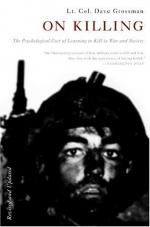
|
| Name: _________________________ | Period: ___________________ |
This quiz consists of 5 multiple choice and 5 short answer questions through Section 7, Killing in Vietnam: What Have We Done to Our Soldiers? : Chapter 2, What Have We Done to Our Soldiers? The Rationalization of Killing and How it Failed in Vietnam.
Multiple Choice Questions
1. According to Grossman in Chapter 2, what is the purpose of after-mission briefings in modern wars?
(a) Sharing best practices.
(b) Allowing a cool-down period for soldiers.
(c) Researching the stressors most affecting men.
(d) Reinforcing the rightness of their combat.
2. As described in Chapter 5, natural warriors are able to kill without what?
(a) Nausea.
(b) Acknowledging it.
(c) Remorse.
(d) Weapons.
3. In Chapter 5, what is another profession Grossman mentions that natural warriors often enter besides the military?
(a) Law enforcement.
(b) Construction.
(c) Professional sports.
(d) Advertising.
4. In the World War II stories of Chapter 4, what do soldiers do to avoid killing?
(a) Pretend to be dead.
(b) Smoke cigarettes.
(c) Surrender to German troops.
(d) Sleep.
5. How were tours of duty different in Vietnam compared to other wars?
(a) Tours could be anywhere, not only the capital.
(b) Tours of duty were not voluntary.
(c) Tours were individual, not unit-based.
(d) Tours were 24 months instead of 12.
Short Answer Questions
1. What is a common feature of natural warriors presented in Chapter 5?
2. Which of the following is not an example provided in Chapter 2 of Vietnam's "dirty" combat?
3. In the story at the beginning of Chapter 3, what percentage of soldiers questioned said they were certain they had killed even one enemy in combat?
4. In the final story of Chapter 4, the one in which an American and Viet Cong soldier happen upon each other, who is killed?
5. During World War I, what was the favored weapon of American servicemen for killing enemy combatants?
|
This section contains 279 words (approx. 1 page at 300 words per page) |

|




